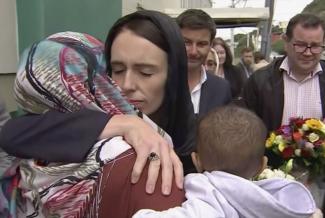Blog
A peaceful and welcoming country

I am from the USA, a country where shootings, murder and hate crimes are fairly commonplace. As a woman from a largely Muslim family, I am impressed by the outpouring of solidarity the Kiwis – as New Zealanders call themselves – exhibited after the atrocious murders in Christchurch. Kiwis took to social media, visited their local mosques, gifted care packages and hung banners to let their Muslim neighbours know they did not grieve alone. Some Kiwis also now want their government to accept more refugees, in particular from the Middle East.
Immediately after the shooting, Prime Minister Jacinda Ardern stood by the victims and those affected by the terror attack in solidarity. She was defiant that her country would not allow extreme and hateful ideologies to prosper within its borders. “They are us,” she said, referring to the victims. She also vowed to strengthen New Zealand’s gun laws and promised to announce the specifics within 10 days.
I can’t help but compare this to Donald Trump, who the shooter referenced in his manifesto as “a symbol of renewed white identity and common purpose”. His unwillingness to condemn shootings and white supremacist attacks in the US persist in stark contrast to Jacinda Ardern’s courage, kindness and decisiveness after the 15 March. All Trump had to say was that he did not consider white supremacists to be a problem because they are “a small group of people”. He neither managed to disown right-wing extremists after the mass murder at the Tree of Life Synagogue in Pittsburgh last year nor after a white supremacist killed an anti-fascist protestor in Charlottesville in 2017.
The depressing truth is that right-wing extremism is systematically underestimated by many western governments. They focus on Islamist violence, but tend to downplay domestic right-wing terrorism. In May 2017, the Anti-Defamation League (ADL), a non-governmental organisation based in New York, estimated the right-wing extremists had been responsible for plotting at least 150 acts of terror in the United States in the past 25 years. That was before Charlottesville. In January last year, the ADL reported that white supremacists were directly responsible for 18 of the total 34 extremist-related murders in 2017. Only nine deaths were linked to Islamic extremists.
In my opinion, German authorities similarly downplay right-wing terrorism. The Amadeu Antonio Stiftung, a civil-society organisation, keeps track of these things. According to its data, at least 194 people have died at the hands of right-wing extremists in Germany since 1990. As the Amadeu Antonio Stiftung adds, German authorities only acknowledge that 82 people were killed by right-wing extremists. In view of such data, I feel that Germans – and western governments in general – pay too much attention to the Islamist terror threat, but don’t worry enough about the threat from the right.
I lived in New Zealand for about a year. I plan to move back in the future. I grew up in Texas, but after Trump was elected, the political and social climate become too tense and hostile for someone from a Middle-Eastern background like me, so I went to peaceful New Zealand. Since the shooting in Christchurch, people have been asking me if I still want to move back to New Zealand. Yes, I still do.
Cema Tork is an intern at D+C/E+Z, sponsored by the Congress-Bundestag Youth Exchange (CBYX), a programme that invites 75 young Americans to work in Germany and 75 young Germans to do so in the USA.
euz.editor@dandc.eu







